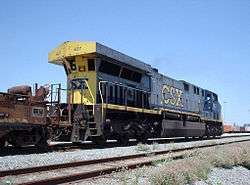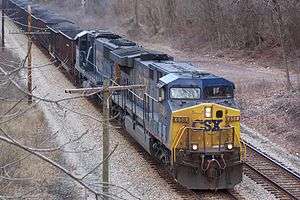GE AC6000CW
|
| |||||||||||||||||||||||||||||||||||||||||||||||||
| |||||||||||||||||||||||||||||||||||||||||||||||||
| |||||||||||||||||||||||||||||||||||||||||||||||||
| |||||||||||||||||||||||||||||||||||||||||||||||||
| |||||||||||||||||||||||||||||||||||||||||||||||||
The AC6000CW is a 6,000-horsepower (4,500 kW) diesel electric locomotive built by GE Transportation. This locomotive, along with the EMD SD90MAC, is among of the most powerful single-engined diesel locomotives in the world. The only locomotive to supass them is the dual-engine 6,600-horsepower (4,900 kW) EMD DDA40X.
History
The AC6000CW was designed at the height of a horsepower race between the two major locomotive manufacturers, Electro-Motive Division of London, Ontario and GE Transportation of Erie, Pennsylvania in the early to mid 1990s. The goal was 6,000 horsepower (4,500 kW).
GE partnered with Deutz-MWM of Germany in 1994 to design and construct the 6,250 hp (4,660 kW) 7HDL engine for the locomotives. The first locomotive constructed was the "Green Machine" GE 6000, the nickname due to the green paint scheme. The first production models were also built in 1995: CSX Transportation 600-602, and Union Pacific Railroad 7000-7009. After testing was completed by GE, they were released to their respective owners in late 1996.

The initial locomotives suffered from various mechanical problems with the most severe being the engine itself. There were major vibration problems which were addressed by increasing the engine mass to alter the resonant frequency. This in turn caused problems with the twin turbochargers. These problems caused GE to push back full production of the new model until 1998. Changes such as stiffer materials and increased engine wall thickness (to increase mass) were in place at full production.
GE built 106 AC6000CWs for Union Pacific with the older, proven 7FDL engine, rated for 4,400 hp (3,300 kW). These units were originally supposed to be converted to the 6,250 hp (4,660 kW) 7HDL engine after the problems were worked out with the engine, but this never occurred. GE considers these units as AC6000CW "Convertibles," while UP classifies them as CW44/60ACs or AC4460CWs.
The AC6000CW ended production in 2001, although Union Pacific's 75xx series remains in daily use as of 2010, mostly on rock and gravel trains in Texas. Union Pacific designates these units as C60AC, CSX as CW60AC.
CSX Transportation derated most of their AC6000CW units from 6000hp to 4600hp to make them more environmentally friendly. These units are classified as CW46AH.
On June 21, 2001, all eight of the Australian railroad BHP Billiton's GE AC6000s combined to set the world record for the heaviest and longest train. They hauled 99,734 tonnes (98,159 long tons; 109,938 short tons) and 682 wagons for 275 kilometres (171 miles) between Yandi mine and Port Hedland. The train was 7.3 kilometres (4.536 miles) long and carried 82,000 tonnes (81,000 long tons; 90,000 short tons) of iron ore.[3] The record still stands.
Operators
.jpg)

- BHP Billiton
- 8 units, numbered 6070-6077, built in June & July 1999.[4]
- These are the only AC6000CW's that were exported outside of the United States. They are the most powerful locomotives to have operated in Australia.[5]
- The 8 units were named after towns and locations in the Pilbara region of Western Australia where they operated.
- 6070 Port Hedland scrapped following an accident in May 2011
- 6071 Chichester
- 6072 Hesta
- 6073 Fortescue
- 6074 Kalgan
- 6075 Newman
- 6076 Mount Goldsworthy
- 6077 Nimingarra
- The 8 units were named after towns and locations in the Pilbara region of Western Australia where they operated.
In 2013/14 these were replaced by EMD SD70ACes.[6] They were eventually scrapped in late 2014 after BHP couldn't find any buyers who were interested in acquiring the locomotives.[7]
- CSX Transportation:
- 3 units, numbered 600-602, were among the first production AC6000CWs built.
- 601 is lettered "The Spirit of Waycross".
- 602 is lettered "The Spirit of Maryland", and is the only AC6000 on CSX property to retain its original Hi-Ad 6-wheel trucks, which are identical to the trucks of the GE Dash 9-44CW , the GE Dash 9-40C, and the GE ES44DC
- 114 units, numbered 603-699 & 5000-5016, were built between October 1998 & April 2000.
- 600-602 original prime movers replaced with 4,400 hp (3,300 kW) 7FDL16 engines. This is due to these units being pre-production models & mechanical differences between them and the production model.
- 603-699, 5000-5016's original prime movers replaced with 4,600 hp (3,400 kW) 16 cyl. GEVO prime movers and new computer equipment essentially making them ES46ACs. CSX classifies these units as CW46AH's.
- 5015 and 5016 were both classified as a CW60AH.
- 3 units, numbered 600-602, were among the first production AC6000CWs built.
- Union Pacific:
- 10 units, numbered 7500-7509, were built between November 1995 & December 1996. These units were originally numbered 7000-7009.
- 45 units, numbered 7510-7554, were built between July & December 1998.
- 7511 suffered an electrical fire and was retired from the roster in June 1999. The damage was covered under warranty and the unit was sent to GE for repairs. GE built another 7511 unit for UP to replace the original in January 2001, renaming the original 7511 to GECX 6002.
- 25 units, numbered 7555-7579, were built in January 2001.
- All were converted to AC4460CW units and renumbered to 6888-6968.
- Union Pacific Convertibles:
- 70 units, numbered 7336-7405, were built between November 1995 & September 1996. These units were renumbered to 7010-7079 to make room for ES44ACs.
- 42 units, numbered 7300-7337, 7339, 7340, 7342, and 7344 were built between March & May 1998.
See also
- EMD SD90MAC A similarly powerful locomotive manufactured by EMD
References
| Wikimedia Commons has media related to GE AC6000CW locomotives. |
- ↑ Official archived engine description
- ↑ 7FDL16 Specifications Page 24
- ↑ BHP breaks its own 'heaviest train' record Railway Gazette 1 August 2001
- ↑ AC6000 Railpage
- ↑ Clark, Peter (2012). An Australian Locomotive Guide. Rosenberg Publishing. p. 288. ISBN 9781921719554.
- ↑ "BHPB Iron Ore Update" Motive Power Issue 91 January/February 2014 page 9
- ↑ http://www.pilbararailways.com.au/gallery/thumbnails.php?album=142
